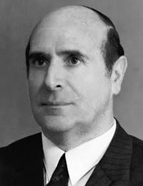

Born in Lisbon in 1920, Jacinto Almeida do Prado Coelho was the son of António do Prado Coelho, a high school teacher and essayist. His literary talent was evident from his teenage years. In fact, before he turned 15, he began publishing narratives, poetry and criticism in the Estudantes de Portugal [Students of Portugal] magazine in 1935 and 1936 . He lived in Lisbon his entire life, where he completed his degree in Romance Philology in 1941 with a thesis titled A Poesia de Teixeira de Pascoais [The Poetry of Teixeira de Pascoais]. Under the guidance of Vitorino Nemésio, he boldly chose to present a thesis on a living poet. The book was published in 1945 and included a short poetic anthology by the author of Marânus. Prior to that, in 1943, he presented the critical-pedagogical essay A Educação do Sentimento Poético [The Education of Poetic Sentiment], published the following year. In this work, he reveals one of the strengths of his teaching and essay writing: a pedagogical concern. Rather than focusing on didactics, he emphasises educational work — the "living culture" — believing that poetry should play a key role in the education of young people. He also advocates for "lifelong self-education” among teachers, asserting that without this, educators cannot fulfil what truly matters: being genuine humanists.
In 1943, Jacinto do Prado Coelho was invited to become an assistant professor. He received his PhD in 1947 with a thesis titled Introdução ao Estudo da Novela Camiliana [Introduction to the Study of Camilo Castelo Branco's Novels], published the previous year. This refreshing and comprehensive work has become a classic in Camillian studies. Aiming to "see how the Camillian novel materialises, grows and transforms", he emphasises the importance of "understanding the biographical circumstances" that shed light on the novel's origins, meaning and the author's originality. As a tribute to his father, a distinguished Camillianist, the work showcases the confidence, rigour, and extensive knowledge of a researcher who, at just 27, had thoroughly mastered the extensive work of the author of Amor de Perdição [Love of Perdition], as well as Camilo's dialogical relationships with both national and international classic and contemporary authors. In 1951, in the competition for extraordinary professor, he presented a pioneering study for the first time at a Portuguese university: Diversidade e Unidade em Fernando Pessoa [Diversity and Unity in Fernando Pessoa], published that same year, when a substantial portion of Pessoa's work was still unknown. Due to its theoretical depth and refined style analysis — akin to the approaches of Leo Spitzer or Dámaso Alonso — the methodology employed was rooted in the criticism that he consistently favoured; an approach that remains a significant component of the extensive bibliography dedicated to the poet of the heteronyms. In 1953, at the age of 33, Jacinto do Prado Coelho reached the pinnacle of his academic career, working as a full professor of Modern Portuguese Literature for 30 years until his untimely death.
